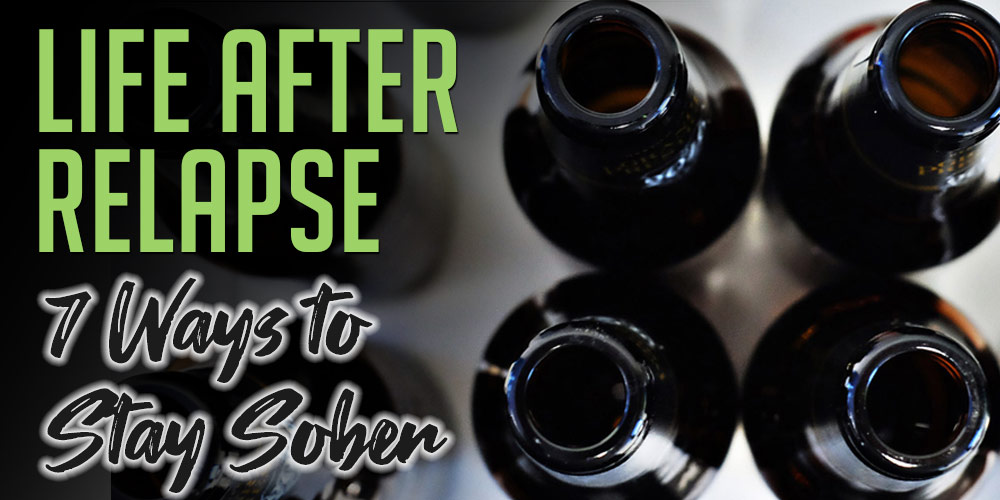
Facing the fallout of a relapse can feel devastating for a person in recovery from addiction, but it’s important to know that you haven’t failed and there is life after relapse.
In truth, setbacks are a normal part of recovery and it’s certainly not a reason to throw away all of the hard work that went into getting sober.
Some people will quit drinking alcohol on their own without getting proper treatment or going to meetings that offer support from others in recovery.
This can lead to dry drunk syndrome, where people stop drinking but still have many of the symptoms or difficulties associated with addiction, including relapse.
The most effective response to a relapse is to acknowledge it without any guilt or shame, and then set your sights on getting back to the work of recovery.
That might sound like it’s easier said than done, but here’s something to consider. You’re not the first, nor will you be the last, person that has ever relapsed. It is a common in recovery.
Relapse Rates Study
An eight-year study on abstinence found that only about a third of people who are sober for less than a year will remain sober. After a year of abstinence, that number improves to less than half of the people battling relapse.
After five years of sobriety, less than 15 percent of people relapse.
So, time is on the side of those who find ways to overcome their triggers and cravings, even after a relapse.
“Addiction is a product of deep learning,” Marc Lewis writes in his book, “The Biology of Desire.”
Compulsively engaging in addictive behavior actually creates changes in the neuro-pathways of the brain. It affects the way we think and feel.
With recovery, though, the brain’s chemistry starts to rebalance and as time passes, the likelihood of relapse decreases with each subsequent year of sobriety.
The message here is don’t give up, keep going. There is life after relapse.

7 Ways to Stay Sober and Improve Life After Relapse
1. Get Help or Find Compassionate and Understanding Support
Finding compassionate and understanding support might mean returning to the safety of inpatient treatment, or going to an outpatient program that meets your specific needs.
There are also a variety of support groups like Alcoholics Anonymous, Narcotics Anonymous, SMART Recovery or other organizations focused on recovery from addiction.
2. Learn To Overcome Addiction Triggers
An addiction trigger is a physical or psychological switch that goes off when a person is reminded of the “high” associated with substance abuse. A trigger can be an environment, like running around with old drinking friends or seeing a once favorite bar.
Physical withdrawal from alcohol or drugs can also trigger the body’s desire for the “high.” Even emotional turmoil, stress, and anxiety can trigger a person’s longing for escape in substance abuse.
Learning to cope with overcoming addiction triggers is an incredibly effective tool in preventing further relapse. Triggers are inevitable. Knowing they’re coming and understanding how to handle them is the key to successfully managing them.
3. Find a Purpose or New Career Life After Relapse
People in recovery are often rebuilding their life, which is a noble and worthwhile effort.
Cultivating a new purpose, passion, or even starting a new career can be immensely satisfying and meaningful for your recovery. This might mean taking up a new hobby, adopting a pet, or even returning to school to train for something you’ve always dreamed of doing.
Alternately, others in recovery might find that their job, and the stress that comes with it, is a trigger that makes sobriety needlessly difficult. In that case, looking for low stress jobs can offer a more balanced journey in recovery.

4. Find Ways to Increase Dopamine Levels
Dopamine is a powerful neurotransmitter in the brain that’s associated with feelings of pleasure and pain reduction. In early recovery, many people lack sufficient dopamine because of addiction-related imbalances in their brain’s chemistry, which can make it difficult to feel joy and pleasure.
However, that’s temporary and as the body and mind heal, knowing how to incorporate natural ways to increase dopamine levels becomes very important.
This might sound complex, but it’s actually as simple as maintaining a healthy diet, exercising regularly, spending time with loved ones, being in nature, and laughing with friends.
5. Learn How to Increase Serotonin Levels
Another chemical messenger or neurotransmitter, serotonin is similar to dopamine in that it’s associated with good mental health, wellbeing and mood. While serotonin ends up in the brain, 90 percent of serotonin receptors are located in the intestines, GI tract and gut.
In recovery, learning to feel good and experience joy and satisfaction without alcohol or drugs is a top priority. So, knowing how to increase serotonin levels naturally by simply developing healthy habits is vital.
6. Meditation and Mindfulness Help Focus Your Life After Relapse
Learning how to quiet the mind, keep focus on the immediate moment and not engaging with passing urges or negative patterns of thought is a powerful tool in recovery and for your life after relapse.
Practicing meditation and mindfulness has shown to be one of the best ways to lower cortisol naturally, sometimes referred to as the “stress hormone,” and actually increase the body’s production of dopamine and serotonin.
These techniques take regular practice, but the rewards are invaluable. People who regularly practice mindfulness and meditation are able to stay clam, present, and centered even during adversity.
7. Sleep
This one sounds simple, but many people have irregular sleep schedules or difficulty sleeping, especially in early recovery. Sometimes this is a result of mental health issues like depression or anxiety, and a constantly ruminating brain can be detrimental to proper sleep.
Along with a healthy diet and regular exercise, proper sleep is one of the three pillars of good health and wellbeing.
It may take a little while, but practicing good sleep hygiene by doing things like going to bed and waking up at the same time every single day can work wonders. This routine helps the balance the body’s circadian rhythms and provides more restful and regenerative slumber.
For those in recovery, staying sober can be difficult, but things often get easier with time. A slip up is just a temporary setback and not a complete failure. Learning that there is life after relapse, and using some of these tips for staying sober, are excellent ways for getting back on track and staying there.
Related Posts
- How to Stay Clean and Live the Sober Life
Drinking and drug use are forms of self-medication that many of us engage in to…
- Sober Happy Hour Alcohol-Free Way to Drink and Socialize
Sober Happy Hour is a growing movement to continue socializing while drinking alcohol-free drinks. And…
- Healthy and Happy Gut Equals a Happy Life
We need to talk about a Healthy Gut! There are many ways that we have…
